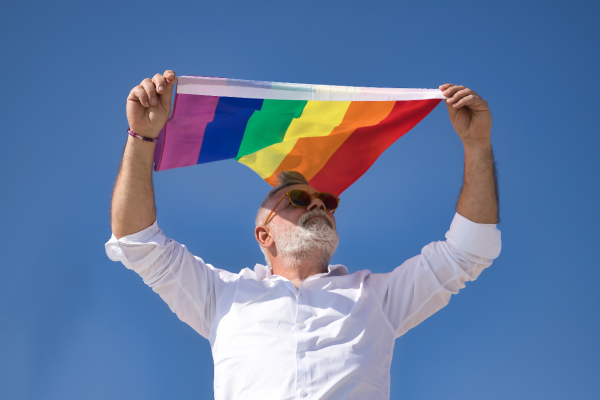 Aging can be difficult for anyone, but older adults who identify as lesbian, gay, bisexual, transgender, queer, or intersex (LGBTQI) face unique challenges and difficulties. If you have a loved one or family member who identifies as LGBTQI, here are some things you should know about as they age.
Aging can be difficult for anyone, but older adults who identify as lesbian, gay, bisexual, transgender, queer, or intersex (LGBTQI) face unique challenges and difficulties. If you have a loved one or family member who identifies as LGBTQI, here are some things you should know about as they age.
Unique Disparities
While sexual orientation is less stigmatized today, older adults who identify as LGBTQI may have experienced a lifetime of discrimination and mistreatment, resulting in unique problems, including:
- Health disparities: Years of discrimination and mistreatment can manifest in a person’s physical health, such as mental health challenges and chronic health conditions. For example, if a person who identifies as LGBTQI was discriminated against in employment and housing, they may have lived in conditions that were unhealthy without access to proper healthcare. As they age, these early experiences could cause poor health outcomes.
- Poverty: Similarly, discrimination based on sexual orientation could have prevented a person who identifies as LGBTQI from gainful employment and benefits. Furthermore, because marriage inequality existed up until the 2015 Supreme Court decision in Obergefell v. Hodges, many same-sex partners were excluded from spousal benefits. The accumulated years of discrimination have left many LGBTQI older adults in poverty or close to it.
Housing and Community
Even though society has come a long way in accepting people with different sexual orientations, it can still be challenging to find the right living and social community for LGBTQI older adults. Here are some clues to look for in a community that will be welcoming for your loved one:
- Consult SAGECare, an organization that provides training, credentialing, and consulting on LGBT aging issues.
- Look at a community’s materials, website, social media, and policies for any indication of LGBTQI-friendly stances. Are there any LGBTQI individuals or couples featured? Do their policies explicitly address same-sex cohabitation?
- Look at geographic regions with a high LGBTQI population.
- Ask for recommendations from other LGBTQI older adults or their families.
Fortunately, there are senior living communities that specifically cater to LGBTQI older adults and many more planned for the future.
Estate Planning
Even though same-sex marriage is now legal across the United States, many LGBTQI older adults lived most of their lives without the ability to marry the person they loved. If their same-sex partner passed away, they might have children or other family members who are not legally recognized as such. Furthermore, some LGBTQI older adults may be estranged from biological family members who did not accept their sexual orientation. Therefore, it is critical that LGBTQI older adults have a valid will that provides clear instructions on their wishes for the distribution of their estate.
Contact an Estate Planning Attorney for Assistance
If you or your loved one encounter any challenges or discrimination when assisting or advocating for an LGBTQI older adult, contact our Brandon estate planning attorneys who have extensive experience representing LGBTQI individuals in these matters. To schedule a consultation, simply call our office at (813) 438-8503.
